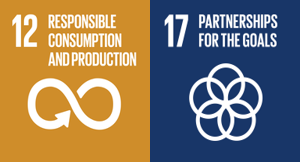CMPC: Partnerships with Chile’s government in zero waste programs

CMPC is a global company with operations in 8 countries in Latin America and over 17,000 direct employees. It produces and markets products derived from wood and fiber coming from certified sustainable plantations and recycled materials, sold in over 45 countries globally. The company's solutions include wood products, market pulp, packaging products, and tissue and personal care products.
CMPC has aligned its corporate purpose with the SDGs to leverage the contribution its operations and activities can have to the 2030 Agenda.
Summary
A shift from a linear to a circular economy is a societal imperative and companies must lead the way through their operations and products. Two of CMPC’s packaging subsidiaries have joined the “Zero Waste to Landfill Clean Production Agreement”, launched in September 2018. It joins together government agencies, various actors from the waste management industry, waste generating businesses and WBCSD’s Chilean Global Network partner (Acción Empresas).
The objective of the agreement is to reduce the volume of industrial solid waste sent to landfills through the implementation of circular economy practices such as waste valorization or waste avoidance. Businesses work on the gradual implementation of the agreement in collaboration with the Chilean government’s agency for sustainability and climate change.
The first phase generates an initial assessment of the company’s waste generation status and capacity to reach the zero waste to landfill goal. The next phase will focus on the implementation of waste reduction and/or valorization practices throughout the manufacturing facilities, leading to the certification as a zero-waste business upon completion and validation by an external auditor.
Background
At CMPC, reducing the amount of waste generated and later disposed is a key aspect of the sustainability of its mills and plants, not only due to the environmental impact of waste itself but also the GHG emissions and risk associated with the transport logistics between facilities and landfills.
Additionally, the prevailing situation in Chile is that the cost of waste disposal is increasing, and several large disposal sites will be closing in the coming years with no new sites being added.
Therefore, CMPC decided to enroll in the early stages of this voluntary and collaborative initiative two of its packaging plants, which send an important amount of waste to landfills, with the intention of developing large-scale solutions to reduce and/or find new uses for waste. By building alliances with key actors from both the public and private sectors, CMPC will be impacting SDGs 12 and 17.
Initiative
Before joining the initiative, several plants were shortlisted as good candidates due to the nature of their operations, size, location, and leadership team, among others. The importance of this initiative lies in the opportunity to use it as the basis for a company-wide zero waste program if the outcome from these two facilities proves to be successful.
Some concerns prior to joining had to do with potential failure to meet the goal, the cost of participation and more importantly the activities required to reach the goal, presence of the government as a regulator, and the time frame. After building a strong internal business case and signing onto the initiative, the first few external audits confirmed that the expected outcomes were very likely.
All partners in this effort are critical but especially cross-sector businesses as one company´s waste might be a valuable raw material for another business, hence the hope is to increase awareness and win-win relationships.
Key outcomes & lessons learned
The initiative has already gone through a first round of diagnostic audits. At both plants, a number of actions have already been implemented and they will continue to work over the next year to identify innovative solutions to encourage waste prevention, recovery and valorization. To achieve the “zero waste to landfill” certification a final audit will ensure that 100% of the established commitments have been met. These expected outcomes would greatly contribute to SDG 12, especially on target 12.5.
Next steps
The approach and lessons learned in this initiative will gradually be expanded to all other productive facilities the company owns and manages throughout Latin America. This initiative will be central to CMPC´s efforts to adopt circular economy principles and serve as a pilot for what the company believes will be the “new normal”: industrial facilities with zero waste to landfill.
More information
To learn more about CMPC'S initiative, please consult http://accionempresas.cl/programa/acuerdo-de-produccion-limpia-apl-cero-residuos-a-rellenos-sanitarios/.


